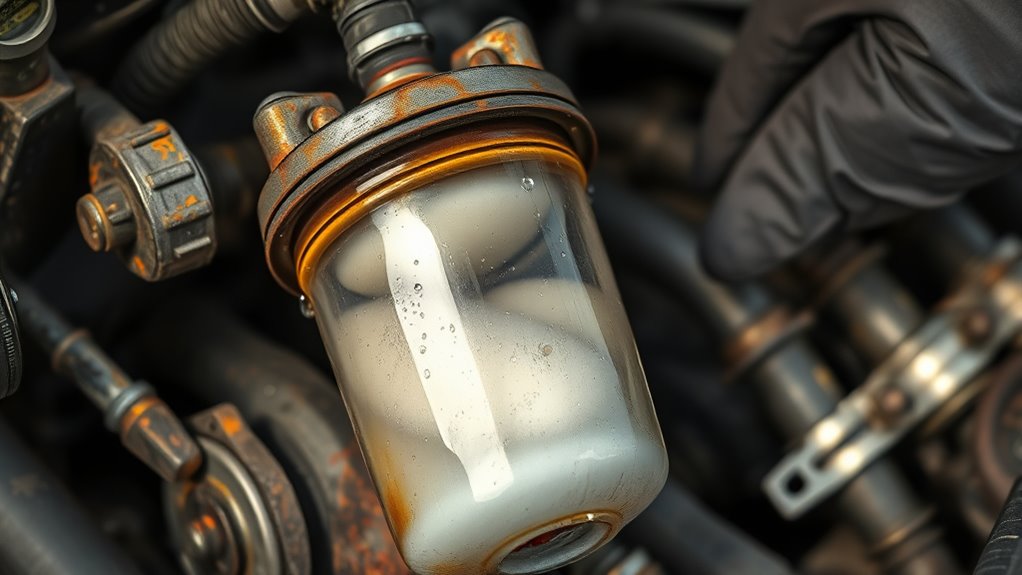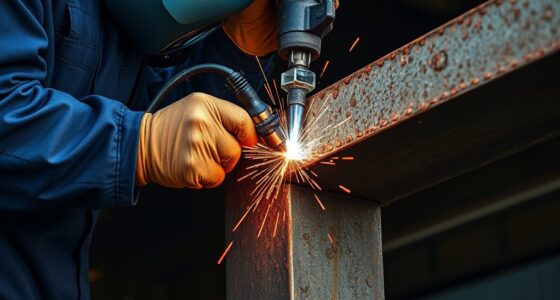To prevent fuel problems with ethanol gas, store your fuel in airtight, sealed containers and add a fuel stabilizer designed for ethanol blends. Keep tanks full to minimize moisture buildup, and avoid long-term storage without stabilizers. Regularly inspect and replace fuel filters, and avoid storing fuel for extended periods. Keeping your fuel system clean and well-maintained helps prevent degradation and corrosion—if you want to learn more about this, keep exploring the tips that follow.
Key Takeaways
- Store ethanol-blended fuel in airtight, sealed containers to prevent moisture absorption and reduce degradation.
- Use fuel stabilizers designed for ethanol fuels to inhibit moisture buildup and maintain fuel quality.
- Regularly operate your vehicle or drain stored fuel for extended periods to prevent long-term degradation.
- Keep storage areas cool and dry to minimize humidity-related fuel breakdown and corrosion risks.
- Perform routine maintenance, including inspecting and replacing fuel filters, to prevent deposit buildup and engine corrosion.

Many vehicle owners are discovering that using ethanol-blended gas can cause more problems than they expected. One notable issue is storage degradation, which occurs when ethanol’s properties lead to the breakdown of fuel over time. Ethanol attracts moisture from the air, creating a humid environment inside your fuel tank or storage container. This moisture accelerates fuel degradation, resulting in poor engine performance, difficulty starting, and increased emissions. If you don’t use your vehicle regularly or store fuel for long periods, this degradation becomes even more pronounced. To prevent this, you should consider using fuel stabilizers designed specifically for ethanol-blended gas. These additives help preserve fuel quality by preventing moisture accumulation and slowing the breakdown process. Additionally, always store fuel in airtight, sealed containers to minimize exposure to humidity and air, which exacerbate storage degradation.
Engine corrosion is another serious concern associated with ethanol-blended fuels. Ethanol acts as a solvent, which can loosen existing deposits and contaminants inside your fuel system, causing them to circulate through your engine. Over time, this can lead to corrosion of metal components such as fuel lines, injectors, and carburetors. The presence of water in ethanol-blended fuels further worsens this issue, as water facilitates rust formation and accelerates corrosion. If left unchecked, corrosion can result in costly repairs and reduced engine efficiency. To combat engine corrosion, it’s essential to keep your fuel system clean and well-maintained. Regularly inspecting and replacing fuel filters, using high-quality fuel, and avoiding storing fuel for extended periods are necessary steps. Installing corrosion inhibitors in your fuel can also provide an extra layer of protection, helping to neutralize corrosive elements and keep your engine parts intact. Additionally, selecting a reliable brand with good customer reviews can help ensure you are using a quality product that minimizes these risks.
Beyond maintenance, being mindful of where and how you store your vehicle or fuel supplies plays an important role in preventing these problems. Store your vehicle in a cool, dry place, and if you’re storing fuel long-term, consider draining the tank or using stabilizers that specifically target ethanol-related issues. Taking these precautions reduces the risk of storage degradation and engine corrosion, ensuring your vehicle runs smoothly and reliably. Remember, ethanol-blended fuels may offer benefits like reduced emissions, but they also demand more diligent care. With proper storage techniques, regular maintenance, and the right additives, you can substantially mitigate the adverse effects of ethanol on your vehicle’s fuel system. Staying proactive helps you avoid costly repairs and keeps your engine performing at its best.
Frequently Asked Questions
How Does Ethanol Content Vary by Region?
You’ll notice regional variations in ethanol percentage in gasoline, with some areas offering up to 15% ethanol, especially in the Midwest where corn is abundant. Other regions, like the West Coast, typically have lower ethanol content, around 10%. These differences are due to local regulations and fuel blends. Be aware of ethanol levels in your area to prevent fuel-related issues, especially if your vehicle isn’t designed for high ethanol percentages.
Can Ethanol Gas Damage Older Fuel Systems?
Yes, ethanol gas can damage older fuel systems. It causes fuel system corrosion and accelerates fuel line deterioration because ethanol attracts moisture, leading to rust and corrosion inside metal components. Over time, this can result in clogged fuel passages and leaks. To protect your vehicle, consider using fuel stabilizers, regularly inspect your fuel system, and avoid storing ethanol-blended fuel for long periods.
What Are Signs of Ethanol-Related Fuel Issues?
You might notice signs of ethanol-related fuel issues if your fuel filter becomes clogged or if your engine misfires. Ethanol can attract moisture, leading to water in the fuel, which causes engine hesitation or rough running. You may also see decreased fuel efficiency or difficulty starting your vehicle. Keep an eye on your fuel filter and watch for misfires, as these are common indicators that ethanol is causing problems.
How Often Should I Add Fuel Stabilizer?
Think of your fuel as a garden that needs regular tending. You should add a fuel additive every 3 to 6 months during storage to prevent ethanol-related issues. This simple storage tip keeps fuel fresh and prevents phase separation. Always follow your additive’s instructions, and verify your tank is full to minimize air exposure. Regularly treating your fuel like this keeps your engine running smoothly, no matter how long it sits.
Are There Any Eco-Friendly Alternatives to Ethanol Fuel?
Yes, eco-friendly alternatives to ethanol fuel include electric vehicles powered by solar energy. You can switch to an electric vehicle, which produces zero emissions and reduces reliance on ethanol blends. Additionally, using solar power to charge your EV makes your transportation even greener. These options help cut down on fuel-related pollution and support a sustainable future, giving you an environmentally friendly way to travel without the issues associated with ethanol gas.
Conclusion
By understanding the potential pitfalls of ethanol-blended fuel, you can steer clear of costly repairs and engine issues. Think of your engine as a delicate garden—if you neglect its needs or ignore warning signs, weeds and pests can take over, choking out growth. Regular maintenance and proper fueling are your tools to keep everything thriving. Stay vigilant, and you’ll keep your engine running smoothly, like a well-tuned symphony that plays in perfect harmony.









